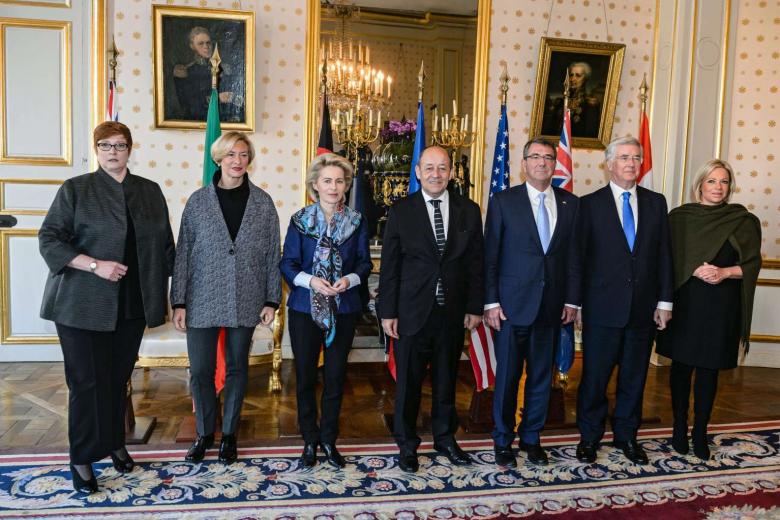PARIS (AFP) - The defence ministers of seven countries leading the battle against the Islamic State in Iraq and Syria (ISIS) met in Paris on Wednesday (Jan 20) to review strategy as the militants spread their influence around the globe.
The French and United States defence ministers, Mr Jean-Yves Le Drian and MR Ashton Carter, hosted the meeting attended by their Australian, British, Dutch, German and Italian counterparts.
British Defence Secretary Michael Fallon said it would look at ways to "capitalise on the setbacks that Daesh (an alternative name for ISIS) has suffered in Iraq and tighten the noose around the head of the snake in Syria".
But the coalition must also face up to the spread of ISIS around the world, notably in Libya, where political chaos has allowed the group to build a 3,000-strong force.
Russia, a staunch ally of Syrian President Bashar al-Assad, was not invited to Wednesday's meeting, though US Secretary of State John Kerry met his Russian counterpart Sergei Lavrov in Zurich at the same time to discuss Syria.
Moscow's air campaign, which it claims is targeted against ISIS, has been criticised for focusing on the moderate opposition to Mr Assad.
"I'm increasingly disturbed by the Russian bombing," Mr Fallon told reporters in Paris.
"We've had estimates of several hundred civilians killed now through the use of unguided munitions in civilian areas, clearly aimed at opposition groups that are fighting Assad, and that I deplore," he added.
ISIS has seen some setbacks, losing around a quarter of its self-proclaimed caliphate, including the Iraqi city of Ramadi to US-backed local forces last month.
Washington this week claimed to have leaked ISIS documents showing the group had cut fighters' pay by half since the coalition stepped up bombing of oil production, a key source of revenue for the group.
But the coalition faces major challenges, particularly the lack of ground forces willing to fight ISIS in Syria, since most groups are focused on toppling Assad.
ISIS showed its continued threat this week, taking 400 people hostage when it attacked the eastern Syrian town of Deir Ezzor. Some 270 have since been released.
"The sooner the civil war is brought to an end the better, and then we can all focus on the enemy that is Daesh," Mr Fallon said.
"That is going to take time, we don't have what's available in Iraq. We don't have a New Model Army standing around the walls of Raqa waiting to move in. But that shouldn't delay us in doing what we can from the air."
UN-brokered Syrian peace talks are tentatively set for next Monday in Geneva, but the main parties have yet to agree on who will represent the Syrian opposition.
Mr Carter has repeatedly urged other countries in the approximately 60-member coalition to step up their participation in the military effort, particularly Arab and Gulf countries that are more focused on fighting Iran-backed forces in Yemen.
In a rare admission, the French army's operations chief, General Didier Castre, recently recognised that the coalition's military strategy was having trouble "producing speedy results".
Libya will be discussed at Wednesday's meeting, but no concrete proposals are on the table, a US military source said.
US, Australian and French instructors have already trained 15,000 Iraqi soldiers, notably against improvised explosive devices (IEDs) and vehicle suicide attacks that are the IS weapons of choice.
But Western forces remain reluctant to get too deeply involved, fearing a repeat of the quagmire of previous campaigns in Afghanistan and Iraq.
Australia has already ruled out any increase to its military contribution, and Canada was pointedly absent from Wednesday's meeting after its new government said it would pull out of the bombing campaign.

